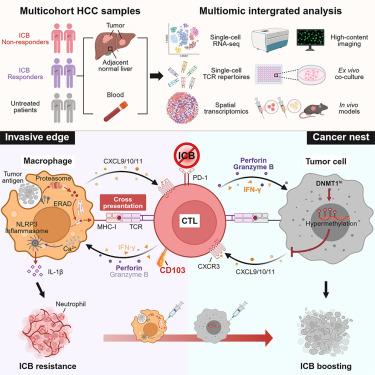细胞毒性 T 淋巴细胞的癌周交叉呈递会损害肝细胞癌的免疫治疗效果
IF 48.8
1区 医学
Q1 CELL BIOLOGY
引用次数: 0
摘要
接受免疫检查点阻断疗法(ICB)治疗的癌症患者可能会出现疾病的过度进展,但反应性细胞毒性T淋巴细胞(CTL)是否以及如何在这种情况下发挥原发肿瘤效应仍是未知数。在此,我们的研究揭示了癌周巨噬细胞通过内质网(ER)相关降解机制介导的细胞膜途径向肝细胞癌(HCC)中的CD103+ CTL交叉呈递抗原。这一过程导致 CD103+ CTLs 滞留在癌周区,从而激活巨噬细胞中的 NLRP3 炎症小体,促进肝癌的进展和对免疫疗法的抵抗。我们对 HCC 患者进行的单细胞 RNA 测序(scRNA-seq)和空间转录组学分析表明,尽管 CD103+ CTLs 具有组织驻留效应表型,但它们的聚集预示着接受多种类型治疗的 HCC 患者的不利临床结果。相应地,重新分配 CD103+ CTL 的治疗策略可以破坏这种与巨噬细胞的致病性相互作用,提高 ICB 治疗 HCC 的疗效。本文章由计算机程序翻译,如有差异,请以英文原文为准。

Pericancerous cross-presentation to cytotoxic T lymphocytes impairs immunotherapeutic efficacy in hepatocellular carcinoma
Hyperprogressive disease can occur in cancer patients receiving immune checkpoint blockade (ICB) therapy, but whether and how reactive cytotoxic T lymphocytes (CTLs) exert protumorigenic effects in this context remain elusive. Herein, our study reveals that pericancerous macrophages cross-present antigens to CD103+ CTLs in hepatocellular carcinoma (HCC) via the endoplasmic reticulum (ER)-associated degradation machinery-mediated cytosolic pathway. This process leads to the retention of CD103+ CTLs in the pericancerous area, whereby they activate NLRP3 inflammasome in macrophages, promoting hepatoma progression and resistance to immunotherapy. Our single-cell RNA sequencing (scRNA-seq) and spatial transcriptomics analysis of HCC patients shows that despite their tissue-resident effector phenotype, the aggregation of CD103+ CTLs predicts unfavorable clinical outcomes for HCC patients receiving multiple types of treatment. Correspondingly, therapeutic strategies that redistribute CD103+ CTLs can disrupt this pathogenic interplay with macrophages, enhancing the efficacy of ICB treatment against HCC.
求助全文
通过发布文献求助,成功后即可免费获取论文全文。
去求助
来源期刊

Cancer Cell
医学-肿瘤学
CiteScore
55.20
自引率
1.20%
发文量
179
审稿时长
4-8 weeks
期刊介绍:
Cancer Cell is a journal that focuses on promoting major advances in cancer research and oncology. The primary criteria for considering manuscripts are as follows:
Major advances: Manuscripts should provide significant advancements in answering important questions related to naturally occurring cancers.
Translational research: The journal welcomes translational research, which involves the application of basic scientific findings to human health and clinical practice.
Clinical investigations: Cancer Cell is interested in publishing clinical investigations that contribute to establishing new paradigms in the treatment, diagnosis, or prevention of cancers.
Insights into cancer biology: The journal values clinical investigations that provide important insights into cancer biology beyond what has been revealed by preclinical studies.
Mechanism-based proof-of-principle studies: Cancer Cell encourages the publication of mechanism-based proof-of-principle clinical studies, which demonstrate the feasibility of a specific therapeutic approach or diagnostic test.
 求助内容:
求助内容: 应助结果提醒方式:
应助结果提醒方式:


